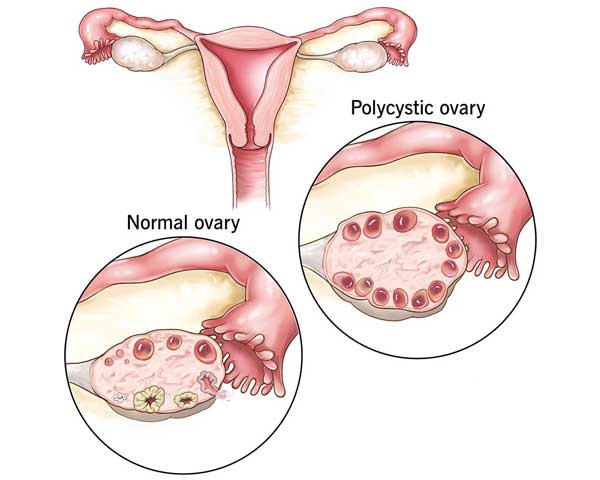Polycystic Ovarian Syndrome (PCOS), also known as Polycystic Ovarian Disease (PCOD), is a common hormonal disorder affecting people assigned females at birth. It is characterized by the presence of small cysts on the ovaries, irregular menstrual cycles, and hormonal imbalances. This condition can have widespread implications for reproductive and overall health. Here's a detailed overview of PCOD:
Causes and Risk Factors
- PCOS/PCOD is believed to have a genetic component, with a family history of the condition increasing the risk.
- Insulin resistance is often associated with PCOS, leading to elevated insulin levels that can contribute to hormonal imbalances.
Symptoms of PCOD Problem / PCOS
- Irregular menstrual cycles, often with prolonged periods or scanty bleeding.
- Elevated levels of androgens (male hormones), leading to symptoms like acne, hirsutism (excessive hair growth), and male-pattern baldness.
- Small cysts on the ovaries, were detected through ultrasound.
Reproductive Implications
- Irregular ovulation can result in infertility.
- Increased risk of miscarriage and complications during pregnancy, such as gestational diabetes and preeclampsia.
Health Risks
- PCOS is associated with a higher risk of developing type 2 diabetes due to insulin resistance.
- Elevated levels of androgens can contribute to cardiovascular issues and metabolic syndrome.
Diagnosis
- Diagnosis involves a combination of medical history, physical examination, blood tests to assess hormone levels, and ultrasound to visualize the ovaries.
Management and Treatment
- Lifestyle modifications, including regular exercise and a balanced diet, are crucial in managing PCOS, especially to address insulin resistance.
- Hormonal contraceptives may be prescribed to regulate menstrual cycles and reduce androgen levels.
- Fertility treatments, such as ovulation induction medications, can assist those trying to conceive.
Emotional and Psychological Impact
- PCOS can have profound effects on mental health, leading to anxiety and depression.
- Support groups and counseling can play a crucial role in managing the emotional aspects of living with PCOS.
Future Implications
- Research is ongoing to understand the long-term consequences of PCOS and develop targeted treatments.
